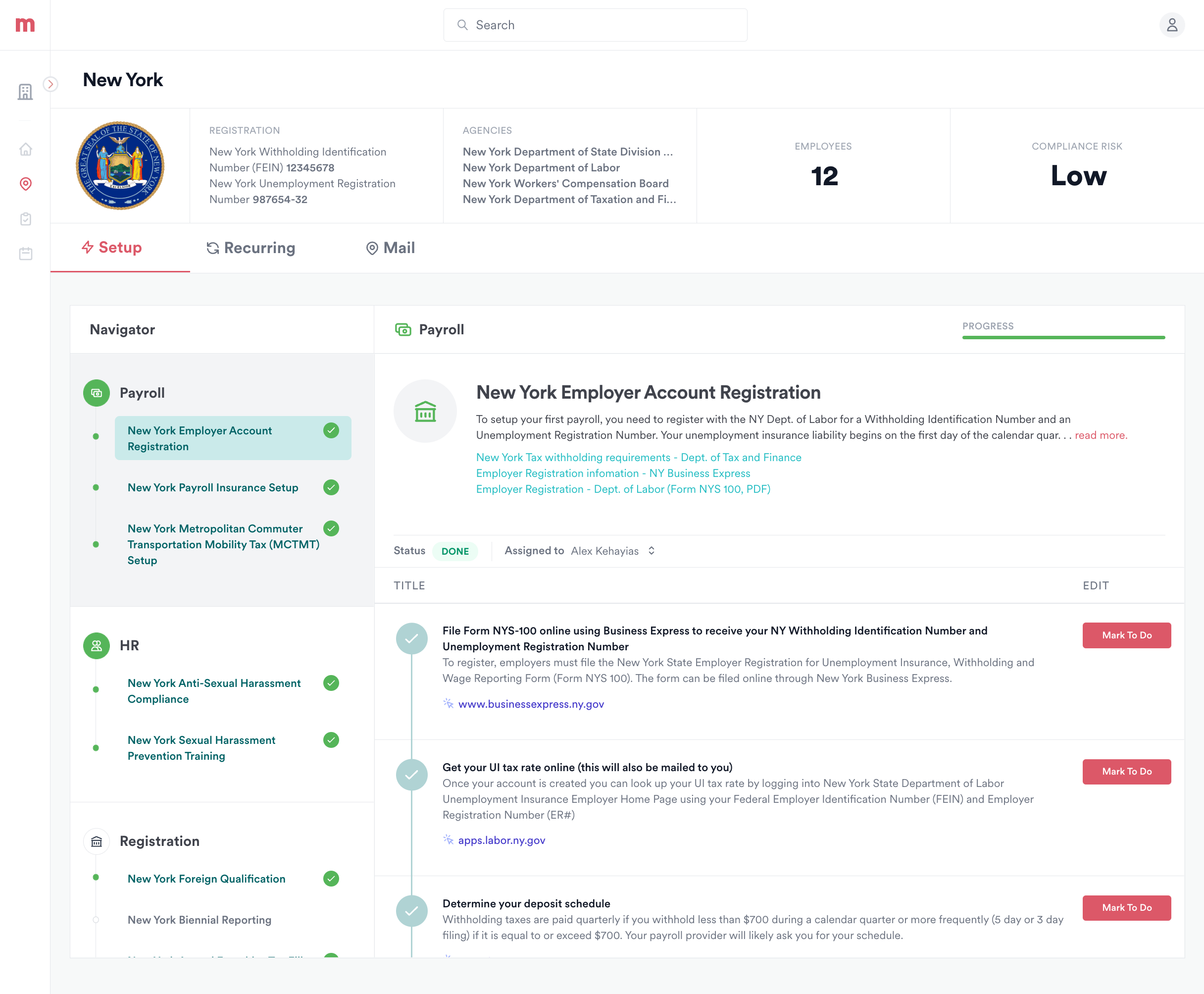Mosey secures fresh capital to help companies comply with payroll rules
It’s clear that remote and hybrid work are here to stay — the pandemic forever changed the way many companies do business. But it’s introduced roadblocks from an HR perspective. For example, for payroll, businesses with employees in multiple states face barriers to opening the necessary accounts for disbursements. Others — fearful of the consequences from noncompliance — are letting vague regulations dictate day-to-day operations. A recent Deloitte report found that slightly over half of companies won’t permit employees to work in locations in which the company isn’t already established for tax purposes.
There’s no one solution to the perennial challenge of ensuring a company complies with multiple tax and employment laws. But Alex Kehayias makes the case that Mosey, the company he founded in 2021, comes close. Mosey offers customers automation tools designed to help U.S.-based companies hire workers remotely and stay compliant, leveraging a database of reporting requirements for all 50 states.
“Decoupling where we work from where we live is one of the most important problems to solve for the future of work. It has enormous potential to improve access to opportunity, but many businesses currently struggle because multi-state compliance is too difficult,” Kehayias told TechCrunch in an email interview. “Our customers are fast-growing businesses ranging from early-stage startups like Watershed, Mystery, Common Room all the way up to scaling companies such as Coda, ReCharge, Rallybio. Nearly every industry is being transformed by remote work, and our customers are retooling the back office.”
Setting the stage for future growth, Mosey today closed an $18 million Series A round led by Canaan with participation from Gusto, SemperVirens and Charge, bringing the startup’s total raised to $21 million. Kehayias says that the funding will be used to expand Mosey’s team, scale the platform, and establish new partnerships.
Compliance focus
Prior to founding Mosey, Kehayias was a product manager at Morgan Stanley and an engineering manager at Stripe, where he led the new user experience team. While at Stripe, Kehayias built and headed Stripe Atlas, a platform for early-stage startups that — for a fee — tackles bookkeeping blockers, including incorporation and tax filing.
Kehayias notes that most companies rely on a mix of legal, financial and HR consultants to figure out and manage their compliance requirements. This quickly becomes expensive, however, where multiple states are involved. Excepting states that have no income tax, each has its own rules for income tax withholding that companies must navigate. Things get more complicated if employees spend short periods in other states, or if the business is located in a state that implemented a temporary reprieve during the pandemic.
One source pegs the collective cost to corporations of complying with U.S. income taxes at $2 billion.
“The pandemic accelerated the move to remote work, and employee demand for location flexibility has never been higher. Out-of-state hiring increased from 35% before the pandemic to 62% in 2022, and office occupancy rates have stagnated,” Kehayias said. “Yet, the rules and regulations for hiring and managing remote employees are complicated and changing quickly … The industry is quickly moving from remote work enablement to remote work permanence. That means a great deal of change across HR, payroll and tax.”

Image Credits: Mosey
Mosey’s solution is to integrate with payroll providers and government agencies to “recalculate” tax obligations on a regular basis. HR workers can use the platform to open employer and tax accounts automatically — Mosey shows the requirements in each location across payroll, registration and taxes. It also sends alerts and reminders when new requirements are being added and deadlines are approaching.
“The case for Mosey for C-suite decision makers is simple: lower the risk that comes from operating in multiple jurisdictions (e.g., penalties, fines and enforcements) and decrease the cost of compliance by leveraging technology,” Kehayias said. “Mosey leverages many kinds of automation to take more work off of our customer’s hands, [providing] the flexibility to hire wherever the talent is.”
Mosey has its work cut out for it — the tax code is byzantine in the best of circumstances. And the startup faces entrenched competition from companies like Deel, which raised $156 million at a $1.25 billion valuation in April 2021. Other rivals include Symmetrical.ai, Multiplier, Collective and Remote, the last of which was valued at over $3 billion as of April 2022.
But Kehayias claims that the platform is gaining traction, with customers like Calm, Tatari and Coda among Mosey’s early adopters.
In another spot of good news, funding for HR tech startups remains robust despite the economic slowdown, with VCs funneling more than $1.4 billion into HR startups during the month of January, according to PitchBook.
“We’re a small team but growing fast. We’re continuing to build up the product and systems needed to scale to the demand we are seeing,” Kehayias said. “We’re also working very closely with our legal and tax partners to ensure we are always up-to-date, and that businesses can trust such an important problem to us.”
from https://techcrunch.com/2022/08/04/mosey-secures-fresh-capital-to-help-companies-comply-with-payroll-rules/

No comments: